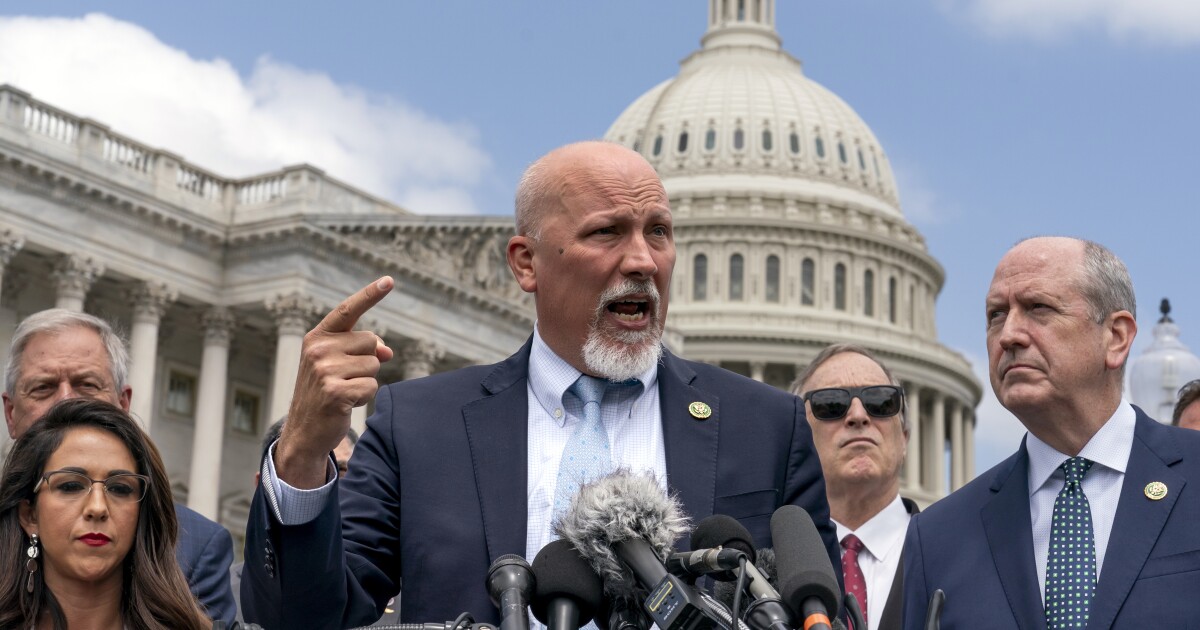

The same debt ceiling standoff that brought House Republicans to the height of party unity eventually tore them apart after Speaker Kevin McCarthy (R-CA) reached a deal with the White House to pass modest spending cuts.
For months, unity meant steering the House GOP conference sharply to the right. McCarthy, leading a threadbare, four-seat majority, gave outspoken dissidents influential committee assignments and crafted conservative bills that could attract their support. Centrists, for their part, largely acquiesced.
BIDEN WORKS TO PUSH DEBT CEILING DEAL OVER THE FINISH LINE
The moves weren’t entirely of his own volition. Members of the House Freedom Caucus forced McCarthy into an arranged marriage of sorts, denying him the speaker’s gavel for 15 rounds in January until he had diminished his own power enough that the most conservative members were satisfied they would not be marginalized.
But McCarthy decided to nurture that arrangement with a charm offensive that included regular consultation with the conservative bloc. By the time Republicans passed a bill in April to lift the debt ceiling in exchange for steep spending cuts, Freedom Caucus members were singing his praises.
Virtually all House Republicans banded together to pass the conservative bill, viewed as an opening offer in negotiations with the White House. The display of unity, combined with Senate Republicans’ refusal to undermine McCarthy, helped move President Joe Biden off his monthslong unwillingness to negotiate.
The GOP honeymoon came crashing to an end, however, as Congress, racing toward a June 5 deadline to avoid default, took up a compromise bill McCarthy brokered with the president that fell far short of Freedom Caucus demands.
In return for a hike in the debt limit, hard-liners wanted to gut Biden’s legislative accomplishments and cut trillions from the deficit over the next decade.
What they got was little more than a two-year freeze in discretionary spending, with deal sweeteners on energy permitting reform and slightly stricter work requirements for food stamps.
The compromise passed the House in a blowout vote on the night of May 31, with a coalition of Democratic centrists and McCarthy loyalists. But the legislation sparked a revolt inside the GOP conference.
Rep. Scott Perry (R-PA), the chairman of the Freedom Caucus, lamented that McCarthy had greenlighted trillions in new spending for a “pittance,” squandering the leverage unity had given them in talks with the White House.
A handful of hard-liners even threatened to hold a “no confidence” vote on his speakership, calling the compromise deal a “betrayal” of the agreement McCarthy struck with them in January.
The final vote, in which more Democrats voted for the legislation than Republicans, only inflamed those tensions.
Yet even the Freedom Caucus stood divided, with some saying he brokered the best deal he could under divided government. Other members rejected the idea that the speaker was really in danger of being deposed.
Nonetheless, GOP leadership has moved to quell conservative outrage. Majority Leader Steve Scalise (R-LA) promised on Wednesday that the deal was just a “down payment” on further fiscal reforms, while McCarthy announced a bipartisan commission to scrutinize the whole budget, not just the slice of discretionary spending Washington tackled in its compromise.
But the goodwill House leadership had painstakingly developed with the Freedom Caucus was now fractured. Hard-liners, despite getting most of what they wanted in the April debt ceiling bill, felt left out of negotiations on the final legislation and apparently worry McCarthy’s decision to cut a deal with Democrats is the beginning of a “new coalition” to circumvent them.
The discontent goes both ways. Rep. Garret Graves (R-LA), one of the lead negotiators for McCarthy, told reporters the “bad-mouthing” of one Freedom Caucus member in particular, Rep. Chip Roy (R-TX), damaged the respect he had developed for the congressman.
Turbulence with the Freedom Caucus must feel all too familiar for McCarthy’s predecessors. Former House Speaker Paul Ryan (R-WI) had to tread softly with its members on issues ranging from the budget to immigration. While Ryan’s predecessor as House speaker, John Boehner (R-OH), famously resigned under threat of a “no confidence” vote in 2015.
Brendan Buck, a former adviser to both speakers, said the brewing revolt was inevitable for McCarthy and demonstrates the Freedom Caucus’s inability to govern.
“McCarthy played a near perfect game here, but when you reach the inevitable result, these folks never accept the reality of what’s achievable,” he tweeted.
But Rep. Patrick McHenry (R-NC), McCarthy’s other negotiator in debt ceiling talks, struck a more hopeful note this past week, hailing their fragile alliance as better than what had been “normative” in recent Congresses.
“House Republicans are in a better situation now, are generically happier now, than in any previous debt ceiling that I’ve encountered in my 20 years here in the House,” he told reporters.
CLICK HERE TO READ MORE FROM THE WASHINGTON EXAMINER
The coming weeks will decide whether the debt ceiling fallout is a rough patch or an irreconcilable rift for House Republicans. Boehner survived almost five years as speaker, after all.
Members of the Freedom Caucus agreed to wait until the debt limit bill was cleared by the Senate and signed into law by Biden to reevaluate that relationship.





